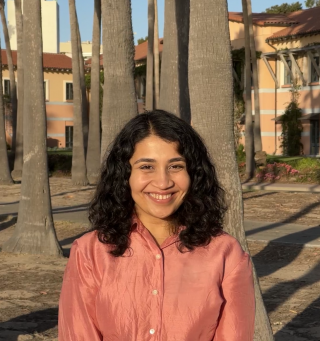Lalitha received her B.Tech degree from Vellore Institute of Technology Chennai, India (2019) following which she worked as a software engineer at Viasat India between 2019-2020. She joined the MS/PhD program at UCSB in Fall 2020 and received her MS degree from Electrical and Computer Engineering in 2022. She is currently a fourth year PhD student and her broad area of research interests include Broadband Wireless Communication Systems and Radar Signal Processing.
Lalitha's current research is focused on:
Reflect-arrays for long-range Line of Sight (LoS) MIMO: LoS MIMO is by now well accepted as a means of taking advantage of the increased spatial degrees of freedom available as we scale up the carrier frequency. However, for fixed transceiver form factors, the available degrees of freedom decay quickly with link range. We explore an innovative approach for creating spatial degrees of freedom for long-range links by utilizing large virtual apertures created by placing multiple reflect-arrays near the transceivers. The use of reflect-arrays in this setting provides beamforming gain in addition to creating spatial degrees of freedom while retaining compact transceiver form-factors.
Geometrically Misaligned Line of Sight (LoS) MIMO: LoS MIMO links in the tera-Hertz band can be used to provide high speed point to point links for emerging picocellular networks. We consider the effects of geometric misalignments caused in LoS MIMO systems. Therefore, in this work we propose an architecture for joint space-time equalization with spatial oversampling by introducing additional receive antennas while maintaining symbol-rate sampling. We consider linear space-time equalization and discuss a novel adaptive windowing scheme to control the complexity of the equalizer.
Lalitha Giridhar, Maryam Eslami Rasekh, Ahmet Dundar Sezer, and Upamanyu Madhow, "Adaptive Space-Time Equalization with Spatial Oversampling for Misaligned LoS MIMO", IEEE Wireless Communications and Networking Conference (WCNC), April 2022

